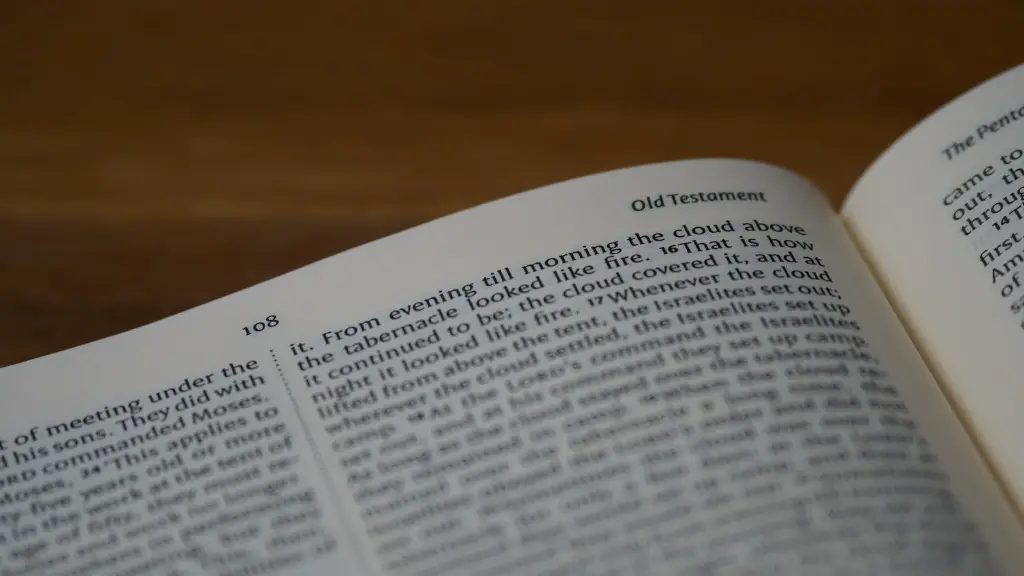Historical Perspective
The debate around the morality of abortion has been raging for centuries. The Bible is no exception, with references to the subject dating back to ancient texts. One of the most famous and oft-cited passages is Exodus 21:22-25. According to this passage, if a man strikes a pregnant woman and causes her to miscarry, then he is to be punished. This suggests that unintentional abortion was seen to be a grievous sin.
However, this same passage implies that the child in the womb does not yet possess the same rights as an adult. If a man kills an adult, he must be put to death. But if a man causes a pregnant woman to miscarry, he must only pay compensation. This could indicate that the Bible saw the unborn child as having a lesser level of rights than an adult.
Other passages differ in their interpretation. In Joshua 20:3, cities of refuge are set aside for those who unintentionally cause the death of someone else. This suggests that the unborn child was viewed as a life that was valuable and worthy of protection. Likewise, Jeremiah 1:5 says that God appointed Jeremiah as a prophet to the nations as view them. “Before I formed you in the womb I knew you” clearly implies that life begins in the womb, and unborn babies have value.
Religious Perspectives
For many religions, the Bible is the primary source of how to live. Yet opinions differ from denomination to denomination on how the Bible ought to be interpreted when it comes to abortion.
The Catholic Church has traditionally taken a strict stance against abortion. They hold that life begins at conception, and that ending a pregnancy would be an act against God. They point to passages such as Jeremiah 1:5 and Psalm 139:13-16 as evidence for their belief. They also believe that life is valuable from conception and so would argue that aborting a pregnancy is always wrong.
By contrast, other Christian denominations such as Lutherans and Presbyterians have more progressive views on the immorality of abortion. While they agree that life is valuable and that it begins at conception, they point to passages such as Exodus 21:22-25 and Joshua 20:3 which imply that in some circumstances, the unborn child did not have the same rights as an adult. As such, they argue that there may be circumstances in which it is acceptable to abort a pregnancy.
Legal Analysis
In the United States, laws around abortion vary from state to state. In some places, abortion has been illegal for some time, while in others, it has only recently been made legal.
Abortion opponents often cite the Bible as the foundation for their beliefs, and use it to argue for stricter laws against abortion. Such opponents often take the position that life begins from conception and therefore aborting a pregnancy is wrong in all circumstances.
On the other hand, those in favour of legal abortion often point to passages such as Exodus 21:22-25 and Joshua 20:3 as evidence that in some cases, aborting a pregnancy may be permissible. They also argue that in some cases, the mother’s life or health may be put in danger by the pregnancy and so aborting is necessary in order to protect her.
Ethical Debate
The morality of abortion is a hugely controversial debate that has raged for centuries. Those who oppose abortion often argue that life begins from conception and so it is wrong in all circumstances. They point to Biblical passages such as Jeremiah 1:5 and Psalm 139:13-16 as evidence for their beliefs.
On the other hand, some critics argue that the Bible does not provide us with a clear answer on the morality of abortion. They point to passages such as Exodus 21:22-25 and Joshua 20:3 which indicate that the unborn child may not have the same rights as an adult, and so suggest that abortion may be permissible in some cases.
Psychological Factors
The debate around abortion is also impacted by psychological factors. Some argue that it can be greatly damaging to women’s mental health to be denied an abortion, or to be forced to carry out a pregnancy that they did not want. They argue that in such cases, aborting the pregnancy may be the best option in order to protect the mother’s mental health.
On the other hand, opponents argue that abortions can be traumatising for the women involved. They point to research which suggests that women who have undergone abortions may suffer from depression and post-traumatic stress disorder.
Societal Impact
The debate around abortion has also impacted how society views women. Opponents of abortion often argue that it is wrong because it devalues the life of the unborn child. However, critics of this view argue that it could be seen as a reflection of how society views women.
Some argue that by denying women the autonomy to make decisions about their own bodies, society is sending the message that women are not as capable or valuable as men. They argue that this could be seen as a reflection of how women have been traditionally treated throughout history, and is indicative of inherent sexism in society.
Medical Debate
The debate around abortion has also impacted the medical profession. Many medical professionals have been deeply divided over whether to provide abortions or not. The debate has sparked off fierce and passionate debates from both sides of the divide.
Opponents of abortions often argue that providing them goes against the Hippocratic Oath which states that doctors ought to do no harm. They also argue that it is wrong in all circumstances and if medical professionals are complicit in the act, they are complicit in a grave sin.
On the other hand, supporters of abortion argue that in some cases it is necessary in order to protect the mother’s health. They point to evidence which suggests that in some cases, continuing a pregnancy can have serious medical implications such as increased risk of blood clots, or even death. As such, they argue that doctors have a duty of care to the pregnant woman and should provide abortions in these cases.
Media Influence
The debate around the morality of abortion has been heavily impacted by the media. Proponents of abortions often point to the fact that many media outlets have a liberal bias, and so only present one side of the argument. Consequently, the debate is often presented in a way that only portrays one side of the argument, thus alienating those with an opposing view.
At the same time, opponents of abortion argue that the media has peddled the notion that it is morally acceptable to undergo an abortion in any circumstance. Furthermore, they argue that the media rarely presents any of the arguments against abortion, and so has had a deeply detrimental effect on how the debate has been perceived by the public.


